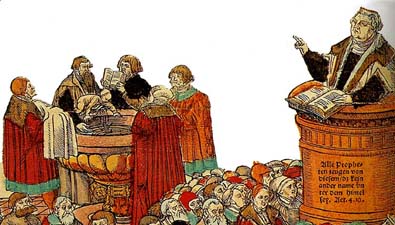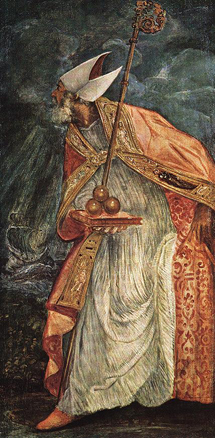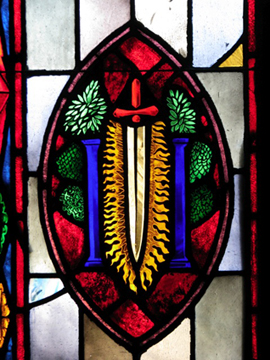October 2015

Luther’s Rose
VIVIT is Latin for “he lives,”
that is, Christ Lives.
The Reformation’s Critical Spirit
What was Martin Luther’s (1483–1546) great contribution to the
Church? It was his discovery that –
Figuring out that Scripture is duplex at its core (condemning and saving), and that the culture is also duplex (renewal and degeneracy), is what Luther uncovers.
Key to both of these is a critical spirit or discernment (John
7:24; Philippians 1:9; 1 John 4:1). The Word, as we noted, has a
condemning component which identified and damns sinfulness. And
our culture always suffers from an endemic degeneracy in morals
and religious thought which constantly needs our reproving
(Matthew 17:17; Philippians 2:15). So when we celebrate the
Reformation on October 25th this year, let us include
thanksgiving to God for this critical spirit.
Pastor Marshall
|
PRESIDENT'S REPORT....
by Earl Nelson
Church Council is starting to look toward the end of the fiscal
year. We’re not
there yet, but I wish to thank the Congregation for responding
to the Council’s pleas for increased giving earlier this year.
Because of this increased giving, instead of being in a
rather deep hole at this point of the fiscal year, we can begin
to see a light at the end of the tunnel, assuming we finish
strong. I know we
don’t talk sports much at First Lutheran, but maybe this is a
moment where we might recall sporting events that were won at
the end. And
doesn’t the Apostle Paul himself admonish himself and us to
finish the race, to make it to the end.
He refers to remaining faithful to the end of life, but
this little race of ours to make our budget is part of that
bigger race.
At the end of July we were $2,000 behind our budget and an
additional $3,000 behind in Major Maintenance Fund.
This is a savings fund that allows us to pay for major
maintenance when it is needed without taking out a loan.
Speaking of loans, in mid-July we finished paying off our
capital improvement loan which was $1,142 a month.
We also expect to see a reduction in our power bill, due
to the efforts of Dean Hard and Dale Korsmo to replace the
remaining incandescent lighting in the church with LED lights.
This project is not quite finished, but has already
reached a point where we use far less electricity.
As we fill out and return our pledges for the next budget year,
let us remember the beginning of this year, when we were already
falling behind our budget.
Council establishes the budget based on the pledges we
receive. Each month
we have to meet certain obligations and set aside some money for
eventual budgetary needs, such as major maintenance.
Council tries to find ways to reduce costs, but the
budget we work with is based on a long history of the needs of
staff and of the church buildings.
The requests Council has been making for increased giving
this year are based on actual need and for the most part cannot
be significantly reduced.
If you park in the parking lot at church you may have noticed a
cleaner look to the front yard of the parsonage.
We’ve made some progress with that (at no cost to the
church) and will continue to work along the side of the
parsonage to improve the appearance.
It also appears that we are going to receive an outside
contribution of $1,000 to Pastor’s Continuing Education Fund.
Our Pastor’s continuing education is an excellent
investment. Pastor
Marshall is likely to make this $1,000 into something much more
valuable, as in the parable of the talents.
He would probably say that if this is so it is by the
grace of God, and I would believe him.
Last and hardly least, do you still have an ornament from the
St. Nicholas tree to bring in?
Larraine King and her St. Nicholas Faire team need as
many of our gifts as early as possible to make the many, many
preparations that go into this worthy cause and exciting
community event.
Stewardship
Budget
Received
Year to date
(Jan-Aug)
$162,312
$160,475 |
|
|
October Book
With
the Mind:
3-5
pm in the Church Lounge, Saturday, October 24th
The book
for October is Catholics:
A Novel (1972, 2006), by Brian Moore (1921–1999), an Irish
novelists who lived most of his adult life in Canada and the
United States. This book is in the tradition of Flannery
O’Connor (1925–1964). It dwells on the tension in the modern
Roman Catholic Church over the old verities and the new updated
version of the faith. In this short book many of the most
salient features in that debate are drawn out.
A copy of this intriguing novel on the religious struggle over
modernity is in the church library. If you would like to
purchase one for yourself, contact Pastor Marshall. Feel free to
attend our meeting when we discuss the debate between the old
and new in the church today.
|
|
Psalms 102.7
Monthly Home Bible Study, October 2015, Number 272
The Reverend Ronald F. Marshall
Along with our other regular study of Scripture, let us join as
a congregation in this home study. We will
study alone then talk
informally about the assigned verses together as we have
opportunity. In this way we can "gather
together around the
Word" even though physically we will not be getting together
(Acts 13.44). (This study uses the RSV translation.)
We need to support each other in this difficult project. In 1851
Kierkegaard wrote that the Bible is "an extremely dangerous
book.... [because] it is an imperious book... – it takes the
whole man and may suddenly and radically change... life on a
prodigious scale" (For
Self-Examination). And in 1967 Thomas Merton wrote that "we
all instinctively know that it is dangerous to become involved
in the Bible" (Opening
the Bible). Indeed this word "kills" us (Hosea 6.5) because
we are "a rebellious people" (Isaiah 30.9)! As Lutherans,
however, we are still to "abide in the womb of the Word" (Luther's
Works 17.93) by constantly "ruminating on the Word" (LW
30.219) so that we may "become like the Word" (LW
29.155) by thinking "in the way Scripture does" (LW
25.261). Before you study, then, pray: "Blessed Lord, who caused
all holy Scriptures to be written for our learning: Grant us so
to hear them, read, mark, learn, and inwardly digest them, that
we may embrace and ever hold fast the blessed hope of
everlasting life, which you have given us in Our Savior Jesus
Christ. Amen" (quoted in R. F. Marshall,
Making A New World: How
Lutherans Read the Bible, 2003, p. 12). And don’t give up,
for as Luther said, we “have in Scripture enough to study for
all eternity” (LW
75:422)!
Week I.
Read Psalm 102.7 noting the word
lonely. What makes us
as lonely as a sparrow on a rooftop? On this read Jeremiah 15.17
noting the words alone,
hand and
indignation. Note
also the words ears,
closed,
scorn and
pleasure in Jeremiah
6.10. Read also John 15.19 noting the words
of,
own,
chose and
hate. Why does God’s
word isolate us like this? Why doesn’t it rather help us gain
many friends and influence people far and wide? On this read 2
Corinthians 4.4 noting the words
god,
world and
blinded. Read also 1
John 5.19 noting the words
whole,
world,
power and
evil. Are we then
driven from the world by its wickedness and left to hole up in
remote places? On this read Hebrews 11.37-38 noting the words
destitute,
wandering,
dens and
caves. Read as well
Luke 9.58 noting the line
nowhere to lay his head. Add to this 1 Corinthians 1.26-29
noting the words worldly,
standards,
powerful,
noble,
shame,
low,
nothing and
boast. Do these many
verses offer a sufficient explanation for what you could call
Christian loneliness? How so?
Week II.
Read again Psalm 102.7 noting the same word
lonely. In our
loneliness, how can we witness to such a world that is passing
us by? On this read 1 Peter 3.15 noting the two occurrences of
the word reverence.
What does this mean? On this read Hebrews 12.28 noting the words
worship and
awe. What do these
words have to do with witnessing? On this read Matthew 17.6
noting the words fell
and faces, and Romans
11.20 noting the word
proud. Awe therefore points to a power that takes away the
control we thought we had over our lives. Because of this awe in
witnessing, God can get through to the worldly ones when we
cannot due to our loneliness. All we need to do is talk and pray
and leave the rest to God. This seems to be the point of the
words only and
growth in 1
Corinthians 3.7. Our talking is like the planting and watering
in 1 Corinthians 3.6. And on the matter of prayer, read Matthew
17.21 noting the words
never and except.
Through prayer God is able to make our efforts effective when we
are not able to. So even though we are removed from the
mainstream by our loneliness, we can still witness effectively
by way of God’s intervention. Do you believe that? If not, read
Ephesians 3.20 noting the words
able,
do,
far and
more. Does that then
do it for you?
Week III.
Reread Psalm 102.7 noting the same word
lonely. Why is this
sparrow perched on a lonely housetop? On this read Acts 10.9
noting the word pray.
This suggests that the housetop is a place in between earth and
heaven, as Luther thought―“I hover between the life of the world
and eternal life, lonely in the faith” (Luther’s
Works 14:181; 67:98). How do we get stuck on this rooftop?
On this read Philippians 3.20 noting the words
commonwealth and
heaven. Read also 2
Peter 3.12 noting the words
hastening and
coming. This frame of
mind gives us at least one foot out of this world which suspends
us in the air as Luther thought. On this suspension read 1 Peter
2.11 noting the word
alien. Is that you? Should it be?
Week IV.
Read Psalm 102.7 one last time noting again the word
lonely. How can we
live with the isolation that comes to us from this loneliness?
On this read Matthew 28.20 noting the words
with and
always. Why is this
so valuable? On this read John 15.13-15 noting the words
greater,
love,
lay,
down and
friends. Does this
make Jesus the best friend possible? On this read Romans 8.3
noting the two phrases
could not do and for
sin. This sacrifice on the cross makes Jesus unique and our
best possible friend. On this promise read John 15.15 noting the
line I have called you
friends. Can this really fill in for having no ordinary
friends? On this read Psalm 27.10 noting the contrasting words
forsaken and
take. In this light
read also 2 Timothy 2.13 with the contrasting words
faithless and
faithful. Note as
well the words faithful
and endure in 1
Corinthians 10.13. Without God we couldn’t endure our
loneliness. On this truth read Matthew 11.29-30 noting the words
rest and
light. Is that enough
for you? In what way?
|
(Genesis 3:24) “These
words are [a] warning…. to guard against sin in the future,
because, as in the case of sickness, a relapse is more difficult
to cure than the first disease…. After receiving the hope of
life through the promise of the Seed [Genesis 3:15], [the
descendants of Adam] should be on their guard lest they sin and
lose it again…. This is why the Lord makes use of such
harshness…. Therefore the Lord God wants man to be satisfied
with the promise of a better life than that in which Adam was
created. [So God] neatly changes the words to the contrary so as
to remind the human being of what he had previously said.
Previously he said: ‘He placed man in the Garden of Eden to work
and guard it’ [Genesis 2:15]. [Then] he says: ‘God sent man out
of the Garden of Eden to till the earth’ [Genesis 3:23]. He
wants man to reflect that he was formed from a clod and was put
in a very excellent place, but that sin caused him to be put
back on the earth out of which he was created. This striking
change to the contrary reminds Adam and his descendants that
they should not only guard against future sins but should also
keep in mind those of the past…. By going into such detail in
this passage [God] indicates that this expulsion was of the
utmost necessity for our salvation…. [And this flaming sword]
maintained watch over Paradise up to the time of the Flood to
serve as a reminder of the wretched and disastrous fall. The
[valley] of Sodom and the pillar of salt [Genesis 19:24–26]
performed a similar function for later generations [Luke
17:32].” [Martin Luther, Lectures on
Genesis 1–5 (1535)
Luther’s Works 1:225,
229–231.] |

More Martin Luther
By Pastor Marshall
For those who confess that Luther is our most eminent teacher (Book of Concord, 576), the publication of volume 67, Annotations on Matthew 1–18 from 1534–35, with sermons on Matthew 18–24 from 1537–40 is a Godsend (and a first time English translation, as well)! This is my ninth new volume that I’ve covered as part of our preparation for the 500th Anniversary of the Reformation two years from now. (Others have been Luther’s Works 58–60; 68, 69, 75–77.) Among my favorite passages in this new collection are the following: “Having sinned does not condemn; it is not repenting that condemns” (11); “The birth of Christ is preached… by a mute creature, the star” (13); “[Clarify Christ] by means of antitheses: how Moses, the philosophers, the laws, the kings, and the wise men of this world are nothing in comparison to this Prince” (14); “The godlessness of one’s person does not destroy or change the office [of pastor]” (14–15); “That people do what has not been commanded…. is the peak of wrongheadedness in every estate of life” (16); “Be swift and vigilant in the work of God” (16); “One may deceive tyrants (just as one may also deceive the devil) if they command us to do something against God” (17); “By nature we are all stirred up by novelty” (19); “The preacher ought to rebuke those who oppose the Word and to inveigh against them severely” (21); “Because no fruits of your faith are evident, it follows that you do not believe” (22); “Faith [is] the root of works” (32); “Christians [should] adorn the Word with deeds. That is a thing as rare as ever today” (42); “It is God’s nature to delay the result of prayer in order to be able to do more and more abundantly than we ask or understand” (43); “True faith… brings along with itself contempt of self and a sense of unworthiness in comparison with others” (45); “The kingdom shall be a cross, and to be cast down in this world shall be your palace” (47); “[The Christian] ought only to use present things like a visitor who is about to move on shortly, and he ought to be ready to leave behind all these things for His sake” (48); “[This] is why [God] allows the devil so much power against humanity: in order that unbelievers, the godless, and the hardened might be pierced through and might learn to fear and trust and call upon God. For if He did not do this, no one would think that he needed God…. Thus He shows them how invincible the devil is (if His gracious hand is withheld). He does this to terrify them and humble them, but to free and save them once they have been humbled” (53); “We must learn not to be moved overly much by God’s punishments of the godless, but much more by His kindness and grace toward the righteous” (56); “It is unbelievers who should keep in mind the works of wrath, and not we believers” (57); “Those who write and cry out against us that our Gospel is too sweet and that it deceives men are the greatest of asses” (61); “The sinner comes in two kinds. The sinner who is afflicted and troubled and desires to be free of sin is a son; the sinner who is secure and does not acknowledge his sin but is righteous in his own eyes is an enemy and a devil. The former is lifted up; the latter is accused” (61–62); “God is reconciled by faith alone without…. our sacrifices” (63–64); “This is the correct use of philosophy: to understand things. All other philosophers are engaged in speculation” (66); “The perverse ones…. make… the forgiveness of sins into license for sins, as too many do today” (71–72); “To call sinners to repentance is to call them, once sins have been forgiven, to the continuous effort of recognizing, hating, killing, and burying sins” (72); “Topics concerning faith need to be emphasized constantly and everywhere in opposition to confidence in works” (75); “Faith [must] be preached against works, even if works cannot be left out afterwards” (76); “Among Christians, death is not death, but a sleep…. [Indeed] the fact that I die means that I shall sleep for a time…. [So] when I die I shall not die, but fall asleep; that when I am dead I am still living, because I live to [Christ]” (77); “Faith should be resolute, persistent, bold, unrestrained, and insistent” (78); “The world [sees to it that] the more the grace of God is praised, the more heretical and diabolical that doctrine must be” (81); “The two things that destroy the… people of God [are] first, when they are deprived of the Word of God [and] second, when they are not defended against godless teachings” (82); “Good shepherds are rare [and] the world, under the ragings of Satan, considers nothing more vile and contemptible than ministers of the Word” (83); “Not unlike the flood by which the old world was turned into a new world [did] the Gospel… make a new world out of the Law” (87); “Ministry [should be] a divine ministry which is rendered no better by anyone’s holiness, no worse by anyone’s unworthiness. [In this way] peace and harmony are preserved in the Church, which is otherwise subject to endless troubles” (88); “Ministers [should receive] what they need to sustain their lives…. [What’s forbidden is the] wish to live in magnificence and wantonness off the goods that belong to the Church…. [Therefore] it is simply greed, arrogance, and excess that are condemned” (90); “Good ministers never labor without benefit when they teach, for they are either of benefit to those who believe, or, when others do not believe, they are a benefit to themselves. Indeed, whoever preaches [does well simply by preaching], leaving to God whether the people believe or not” (94); “Oh, what an unfair situation, where sheep preach to wolves…. It should have been lions that were sent into the midst of wolves…. But these things are done… so that our faith may not be derived from human strength but from… divine power, [for] wolves never become obedient students of the sheep” (95); “We must have an utterly naked trust in God alone [for] this is what you get among human beings: today they befriend you, and tomorrow they persecute you…. They are wolves, therefore, steel your minds as if you were alone in the world…. Therefore, do not put your trust in them even if they make themselves out to be your brothers and friends” (97–98); “We are certain that it is Christ who is the cause of our tribulation” (101); “The mind must be steeled to persevere [for] the beginning is hot; the middle, lukewarm; the end shrinks away in disgust [principium fervet, medium tepet, finis abhorret]” (101); “[We should] scorn our murderers through a haughty faith in God” (105); “Be haughty and give the middle finger to those who [would] kill you” (106); “At every moment the life of your body as well as of your soul is in the hand of God alone” (107); “We are preached by Christ in glory; but Christ is preached by us worms in a place of shame” (110); “Christ [speaks] of the sword passively, not actively. That is, he is not giving us the right to use the sword to put others to death…. He is sending the sword, but against us, not on our behalf, so that we ourselves are forced to suffer the sword” (112); “Children are of their own accord despisers and haters of their parents” (115); “This crucified man is the true God. This is the scandal of scandals… for all nations. This is still the case, and so it must remain forever, because on account of Him as on account of the true God, we must treat everything else as inferior, and He Himself is to be exalted over all things as the true God…. The godless pass these things by with a deaf ear” (116); “Who is there who would not desire to be entirely disassociated from [Jesus], this utterly wretched man [who is] beggarly, crucified, seditious [and] condemned?” (117); “The cross… is the basest thing in the world’s eyes” (117); “You will hate yourself compared to [Jesus] and expose yourself to death and all evils for [His] sake, that is, so that you can bear [the] cross and follow [Jesus], yielding life itself… to [Jesus] as to your God and counting them of secondary worth” (118); “Christ clearly appoints His preachers as gods and makes them equal to Himself…. Whether therefore we are despised or honored, it is not we but God who is despised and honored in us” (120); “Faith is a kind of military service” (130); “However God speaks and acts, it is not right [in the eyes of the world]” (135); “God… hates those who are haughty…. That is what it means to be God” (136–37); “Those who labor, are downcast, wretched, and overwhelmed…. are the ones able to receive [God’s] revelation” (141); “God creates the trust to come to Him” (141); “[You are] in despair [if you are your] own enemy” (141); “Christ… is our calm” (142); “[Christ’s] burden does not weigh down but lifts up, and it bears rather than being borne” (148); “Though some hate [the Gospel], there are always… others who love it” (156); “Where [Christ] is not listened to,… He withdraws and does not litigate with [the] long-winded” (156); “Oh, comfort beyond all telling that belongs to Christians!” (173); “An evil heart cannot but speak wickedly even if it says good things” (178); “Liars must have a good memory” (179); “What a shameful den of murderers is lying in the human heart” (180); “Nothing will remain unpunished” (182); “He always becomes worse off after grace if he falls” (184); “Christ gives a sufficiently lengthy answers [on using parables to confuse], yet one that is lofty and difficult” (190); “When [alienated minds] hear the Word, they have alien eyes and ears, as if they were in another world” (194); “The worst things always come from the best” (197); “We let go [those who] reject our admonitions” (202); “It is, therefore, safer to confess ignorance than to want to understand everything” (207); “The devil does not sleep” (209); “Christ will not abandon His Church…. Therefore… there will always be those who will denounce wicked men and scandals before Christ through prayer, and they will hate them and bear witness against them through confession and preaching” (209); “Christ [is] the most attentive inspector [praesentissimo inspectore]” (210); “This line of reasoning holds good from the beginning of the world: the church is not the Church, and what is not the church is the Church” (211); “The Christian life is such that whoever begins in it seem to himself to have nothing, but he strains and presses forward to take hold of it” (212); “The more progress [a Christian] makes, the more he desires to become and the less he thinks that he is” (213); “Within [the Law and the Gospel] is encompassed the entire wisdom of God, as if gathered together in a short summary” (217); “The Word of God is never so despised as where it is richly taught” (218); “We must put up with despisers. We are not going to change them…. Abel was killed by his brother Cain―not by wolves or bears, but by a human being and brother in the same household, of the same parents, one who could not be any closer” (219); “We must not believe our thoughts about God, for it is certain that our speculations about God make an altogether hostile phantom out of the God who is altogether well-disposed toward us” (230); “The eye always impedes hearing, and visible things take away the Word and invisible things” (231); “All things are impossible for one who doubts [for] doubting makes… sons of misery” (232); “Everything that is done in faith is a good work, since Word-and-faith is a marriage that cannot be dissolved” (243); “God…. Himself has commanded us to obey our parents, but not when they give commands against God” (243); “Whatever can get between your jaws shall not be called sin” (246); “Those who refuse to be made good through God’s kindnesses must be made worse by His rod” (266); “The conscience is a most delicate thing” (269); “His Church… is the front line of an army, a warrior heroine, arrayed against the very gates of hell, that is, against the trials of sin, death, and hell” (283); “Christ and the Church are more ready to loose than to bind” (285); “Christ…. willed to die freely, of His own accord, not because He was compelled” (287); “Christ…. wants the entirety of what we are, what we can, and what we do to be denied” (292); “True denial is defined as [bringing] your will, your understanding―that is, your righteousness, wisdom, works, etc.―into subjugation [and be] foolish, a sinner, and dead in yourself” (292); “Losing one’s life does not mean dying only, but all the… trials that interfere with a pleasant life and the peace of the flesh amid wealth, glory, and delight” (295); “Christ does not say: ‘He will repay every work’; rather, He speaks thus: ‘He will repay each one according to his own works’” (301); “[This is a] miserable and calamitous life. [Therefore we long to pass] from this prison to the radiance of a better life” (308); “Even a small and incipient faith, provided it is a true and certain faith, is able to work miracles in all things” (318); “Christians are a people ready for blows” (324); “What matters in [the] kingdom [of heaven] is not becoming great, but becoming small. But everyone wants to be great; no one wants to be little; these people do not belong in this kingdom” (325); “Those who preach Christ alone, the one in whom we place all our trust and confidence, are the masters and teachers of the Church” (336); “We Christians have so completely turned to stone that we do not care either about God’s favor or about His punishment, but someday the punishment will become so great that we will have to feel it. Therefore, it would be better if we turned now and became more righteous, while it is still the time of grace” (342); “Christians… ought simply to depend on the Word [and] simply believe it because Christ says it” (353); “Whoever seeks God outside of Christ falls into error and offense” (359); “Christians should indeed be like children, but in Christ and not outside of Christ [for] Christians [must] grow [and] become strong [so that they are not] blown here and there by every wind of doctrine” (362); “In opposition to the devil… we should be as proud, intractable, and ill-tempered as we possibly can…. Here let all humility be damned to the depths of hell!” (363); “The devil preaches his poison and false doctrine in God’s name and with a better show than those who preach the true doctrine” (365); “Do not understand the word ‘world’ [when it is being condemned in the Bible] to mean the common man…. Instead, ‘world’ means the best people in the world, such as the most learned bishops, the greatest and wisest rulers, the leaders of the people who have a great following and who are regarded as teaching the right way to heaven” (368–69); “Everything depends on the youth being brought up well. There is a great outcry, and unfortunately it is all too true, that the youth now are so dissolute and wild and that they will no longer submit to direction… This is surely not a good sign” (377); “If someone were to look at the world today in true earnest, it would be no wonder if he perished immediately from the shock”
|

“In August 2011, right before Steve Jobs stepped down as CEO [of
Apple] the enterprise he started in his parents’ garage became
the world’s most valuable company…. His passion for perfection
and ferocious drive revolutionized six industries: personal
computers, animated movies, music, phones, tablet computing, and
digital publishing. You might even add a seventh, retail stores,
which Jobs did not quite revolutionize but did reimagine....
Jobs stands as the ultimate icon of inventiveness, imagination,
and sustained innovation…. He was the admixture of sensitivity
and insensitivity, bristliness and detachment…. He was not
disposed to accept authority…. [He was once] asked if it were
true… that the Apple logo was an homage to Alan Turing, the
British computer pioneer who broke the German wartime codes and
then committed suicide by biting into a cyanide-laced apple. He
replied that he wished he had thought of that, but hadn’t…. [The
Apple logo] was a smart choice. It instantly signaled
friendliness and simplicity. It managed to be both slightly
off-beat and as normal as a slice of pie. There was a whiff of
counterculture, back-to-nature earthiness to it, yet nothing
could be more American. And the two words together—Apple
Computer—provided an amusing disjuncture…. The defining precept
of Jobs’s design philosophy [came from Leonardo da Vinci]:
‘Simplicity is the ultimate sophistication’…. He also sided with
Bob Dylan’s line that if you’re not busy being born, you’re
dying [Bringing It All
Back Home, 1965]…. Jobs said ‘People don’t know what they
want until you show them. That’s why I never rely on market
research’…. He also was very much Zen, with its stark minimalist
aesthetics and intense focus…. Taking LSD was also one of the
most important things in his life…. Finally he thought that
religion was at its best when it emphasized spiritual
experiences rather than received dogma. And so he said that ‘the
juice goes out of Christianity when it becomes too based on
faith rather than living like Jesus, or seeing the world as
Jesus saw it.’” [Walter Isaacson,
Steve Jobs (New York: Simon & Schuster, 2011)
pp. xxi, xx, 13, 12,
xviii, 63, 80, 570, 35, 41, 15.] |
ANNOUNCEMENTS:
NEW MEMBER CLASSES
will be starting on Sunday, October 4th at 11:45 am in room D.
If you are interested in becoming a member please let
Pastor Marshall know.
KORAN CLASS:
A four-week guided reading of the Koran begins October 1st at
7:00 pm.
Interested? Call
206-935-6530 to register or
email deogloria@foxinternet.com.
FOOD BANK DONATION
suggestion for October is tuna and mayonnaise.
THANK YOU
to all who
donated money to help the Sunday School students reach their
goal for their charity project!
You helped the students raise $469 to purchase school
supplies to make school kits for Lutheran World Relief.
LWR is in urgent need of school kits for children in
countries around the world. The
school kits are a string back pack with four spiral notebooks, a
ruler, scissors, crayons, five pens, five pencils, an eraser,
and a sharpener. The
students purchased the supplies and assembled the back-packs on
September 13th. The kits
will be shipped out in October.
The shipment will have a bar code so the students may
track the package to see where the school kits were delivered.
Our Sunday school
students held a bake sale in June to kick off fund raising which
was a success! They
received over $267 from your bake sale purchases!
A big
thanks to all who
baked pies, cakes, and treats. A
big thanks to those
who made purchases. We
could not have done this charity project without the support of
the congregation. Thank
you all!
Also, Hymn School was a success!
Hymn school was held June 17, 18, and 19.
There were 16 children
participating in the three days of crafts and learning
traditional hymns taught by Pastor Marshall.
The students performed
the hymns for residents at Park West Nursing Home.
The students made flower
bouquet crafts to give as gifts to the residents.
Thank you to Pastor
Marshall for teaching the students and to Jane Harty for playing
the piano for the performance. Thank
you to Dana and Matthew Kahn for the craft supplies and for
their time helping. Thank
you to Kari Ceacovschi and Gina Allen for helping with hymn
school. A big thanks to
Rollie Storbakken for producing CDs of the hymns to help the
students learn them!
-Gina Allen, Education Chairman |

ST. NICHOLAS
FAIRE
Sunday,
December 6,
2015 •
4pm to 7pm
|
|
Preparations are well underway.
Sign-up sheets identifying how you can help, will be
posted toward the end of October.
BUT the most important action is to –
MARK YOUR
CALENDAR –
INVITE YOUR
FRIENDS AND
FAMILY!!!!!!!
It will be a
spectacular party with good food and beverages, creative and
practical gift baskets you could give as presents, prizes to win
at the wine toss game, and wine tasting courtesy of Maryhill
Winery. A super way to start off the holiday season supporting
our local charities, and having an awesome experience, all at
the same time!!!
We had a great response to “Christmas in July and August” this
year, and most of the ornaments were taken from the tree.
If you haven’t already brought your “ornament” item to
the church, I will be giving you a reminder call.
If you are interested in helping purchase items to
complete the themed gift baskets, or items that need to be
bought fresh, give me a call (Larraine 206-937-6740).
You can always donate money that will help cover the cost
of any other expenses that we may have.
Remember
that the money we
raise with your help from the St. Nicholas Faire, will be
donated to the
West Seattle Food Bank
& the
West Seattle Helpline.
Help us
make this event fun, memorable, and successful! |
 |
X
PARISH PRAYERS
X
Remember in prayer before God those whom He has made your
brothers and sisters through baptism.
Pray
for the shut-ins that the light of Christ may give them joy:
Pat Hansen, C. J. Christian, Louis Koser, Anelma Meeks,
Dorothy Ryder, Lillian Schneider, Crystal Tudor, Nora Vanhala,
Vivian Wheeler, Peggy & Bill Wright.
Pray for those who have suffered the death of a loved one: Pray
that God will bear their grief and lift their hearts: Pray pray
for the Hansen family on the death of Pat (Patricia) Hansen,
who's Memorial will be here on Saturday, October 17th at 11 am.
Also pray for the Apman family on the death of Donna Apman.
Pray for our bishops Elizabeth Eaton and Brian Kirby Unti, our pastor Ronald Marshall, our deacon Dean Hard and our cantor Andrew King, that they may be strengthened in faith, love and the holy office to which they have been called.
Pray that God would give us hearts which find joy in service and
in celebration of Stewardship.
Pray that God would work within you to become a good
steward of your time, your talents and finances.
Pray to strengthen the Stewardship of our congregation in
these same ways.
Pray for our sister congregation:
El Camino de Emaus in the Skagit Valley that God may
bless and strengthen their ministry.
Also, pray for our parish and it's ministry.
Pray that God will bless you through the lives of the saints:
Saint Frances of Assisi, renewer of the Church, 1226;
Saint Luke, Evangelist; Saint Simon and Saint Jude, Apostles. |
|
A Treasury of Prayers
O Lord,
whose kingdom is not of this world, make yourself known to me as
my Judge. Keep me from being at ease when the world thinks well
of me, or dismayed when it judges me harshly. For your judgments
and mercy, O God, are greater than anything that the world can
give. Help me then to submit to your will and die to my desires,
that I may arise to newness of life. In Jesus’ name I pray.
Amen.
[For All the Saints
IV:1279-80, altered] |


